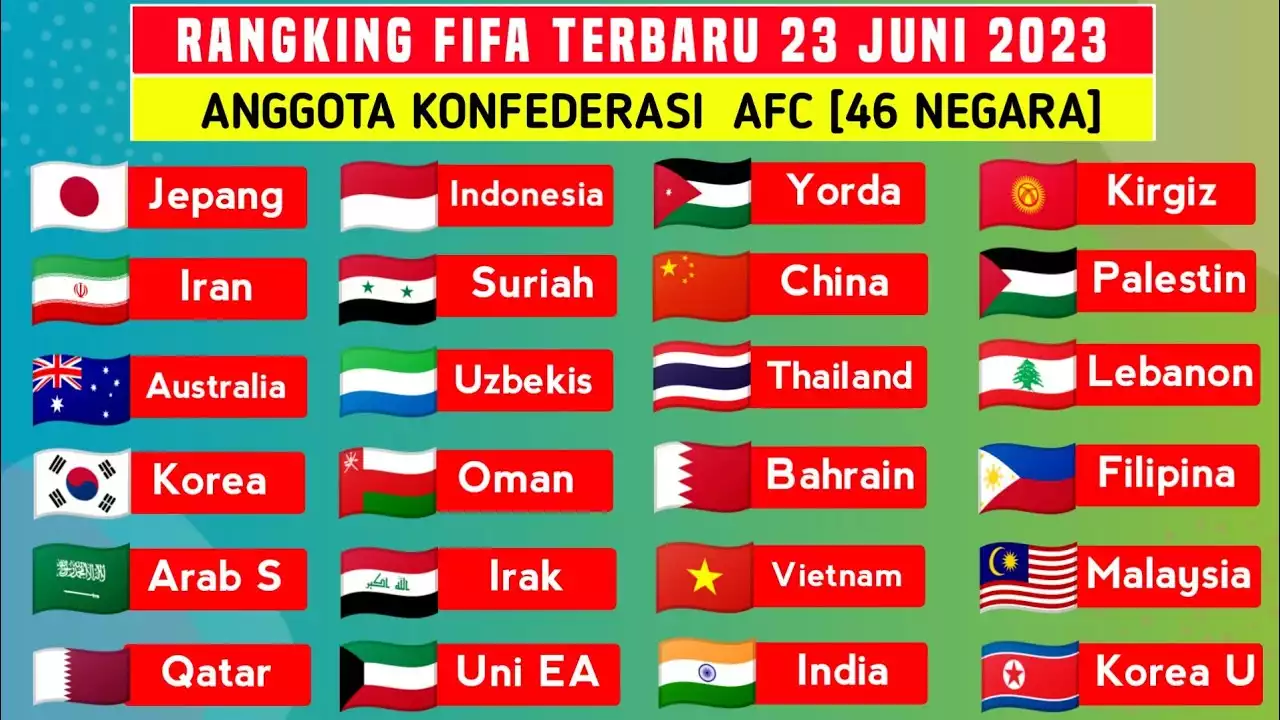What is direct relegation?
Direct relegation is a system commonly used in football tournaments where teams that finish at the bottom of the standings are immediately demoted to a lower division or are excluded from participating in the next edition of the tournament. It is a way to incentivize teams to perform well and avoid being relegated. However, the AFC Asia Cup takes a different approach, eliminating this direct relegation system and introducing a more nuanced approach to determine the participating teams in each edition.
In the AFC Asia Cup, teams have the opportunity to secure their place in the next edition of the tournament regardless of their performance in the current edition. This means that even if a team finishes at the bottom of the standings, they are not automatically relegated and still have a chance to participate in the next tournament.
The history of direct relegation in AFC Asia Cup
The AFC Asia Cup has a rich history that dates back to its inaugural edition in 1956. Over the years, the tournament has evolved, adapting to the changing landscape of football and the needs of the participating teams. Direct relegation was initially part of the competition, with teams facing the risk of being excluded from future editions if they performed poorly.
This direct relegation system was in place for several decades, adding an element of pressure and urgency to the teams' performances. However, as football continued to grow and evolve, the AFC recognized the need for a more inclusive and competitive approach to determine the participating teams.
The controversy surrounding direct relegation
Direct relegation has always been a contentious issue in football. While it serves as a strong motivator for teams to perform well, it also has its drawbacks. Critics argue that direct relegation can be too harsh, punishing teams for a single poor performance or a temporary setback. They believe that it doesn't take into account the overall strength and potential of a team, leading to the exclusion of deserving participants from future editions of the tournament.
The controversy surrounding direct relegation in the AFC Asia Cup reached its peak during the early 2000s, with several high-profile teams being relegated and subsequently struggling to regain their place in the tournament. This sparked a debate among football governing bodies, officials, and fans about the fairness and effectiveness of the direct relegation system.
The decision to remove direct relegation
After careful consideration and consultation with various stakeholders, the AFC made the decision to remove direct relegation from the AFC Asia Cup. This decision was driven by a desire to create a more inclusive and competitive tournament, one that would allow teams to showcase their potential and grow without the fear of immediate exclusion.
The AFC recognized that direct relegation could discourage teams from participating in the tournament, especially those from smaller football nations. By removing this system, the AFC aimed to encourage participation and foster the development of football across the region.
Reasons behind the removal of direct relegation
The removal of direct relegation in the AFC Asia Cup was driven by several key reasons. First and foremost, it was an effort to promote fairness and inclusivity in the tournament. The AFC wanted to ensure that teams had a fair chance to participate in future editions, regardless of their performance in the current tournament.
Additionally, the AFC recognized the importance of stability and continuity in the development of football. By removing direct relegation, teams were given the opportunity to learn from their experiences, improve their performance, and come back stronger in subsequent editions. This approach was seen as a way to encourage growth and long-term development within the participating teams.
Impact of the removal of direct relegation
The impact of the removal of direct relegation in the AFC Asia Cup has been significant. It has created a more level playing field for teams, allowing them to focus on their performance without the fear of immediate exclusion. This has led to a more competitive and exciting tournament, with teams fighting till the very end to secure their place in the next edition.
The absence of direct relegation has also encouraged teams to take risks and experiment with different strategies. Instead of playing it safe to avoid relegation, teams now have the freedom to push their boundaries and showcase their true potential. This has resulted in more entertaining matches and memorable moments for fans.
Reactions from teams and fans
The removal of direct relegation in the AFC Asia Cup sparked mixed reactions from teams and fans. Some welcomed the change, seeing it as a positive step towards creating a fairer and more inclusive tournament. They believed that it would encourage teams to invest in long-term development and help raise the overall standard of football in the region.
However, there were also those who were skeptical of the decision. They argued that direct relegation served as a strong motivator for teams to perform well and that its removal could lead to complacency and a lack of competitiveness. They believed that it might dilute the quality of the tournament and hinder the growth of football in the region.
Alternative strategies for promotion and relegation
With the removal of direct relegation, the AFC Asia Cup introduced alternative strategies for promotion and relegation. Instead of immediate exclusion, teams that finish at the bottom of the standings face additional qualifying rounds in order to secure their place in the next edition.
These qualifying rounds provide an opportunity for teams to prove their worth and showcase their improvement. It also allows for a more comprehensive evaluation of a team's performance, taking into account their overall potential rather than just their performance in a single tournament.
The AFC Asia Cup's unique approach to promotion and relegation has been praised for its fairness and ability to foster growth within the participating teams. It has created a more dynamic and competitive environment, ensuring that every match is filled with excitement and suspense.
The absence of direct relegation in the AFC Asia Cup has added an element of excitement and unpredictability to the tournament. It has created a more level playing field for teams and encouraged long-term development and growth. While the decision to remove direct relegation was not without controversy, it has ultimately proved to be a positive step towards creating a fairer and more inclusive tournament. As teams continue to battle it out on the pitch, the story behind the absence of direct relegation in the AFC Asia Cup continues to unfold, captivating fans and showcasing the true spirit of football.










